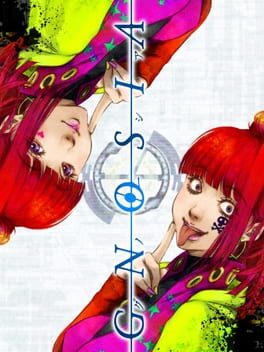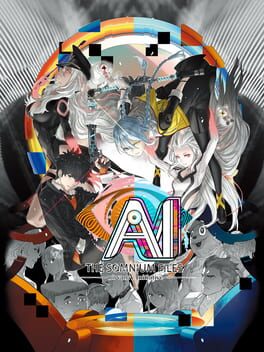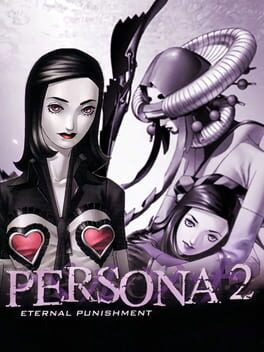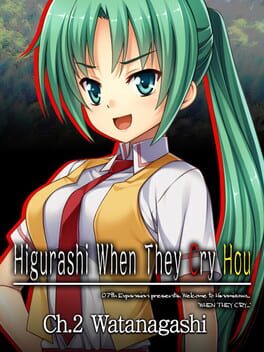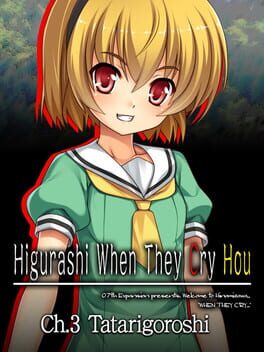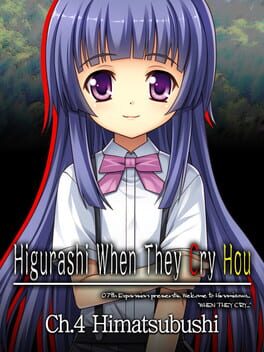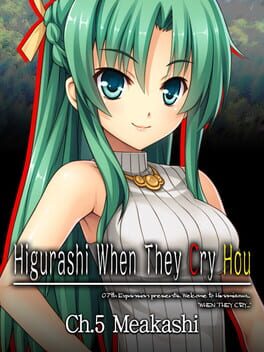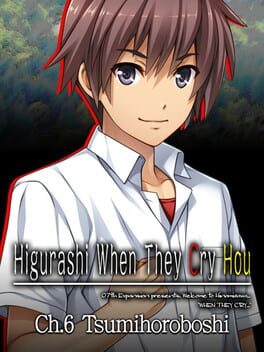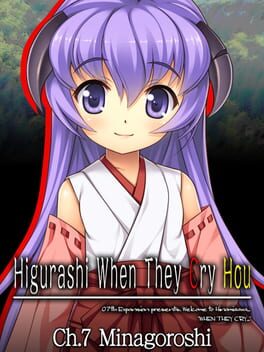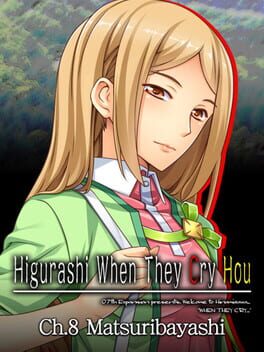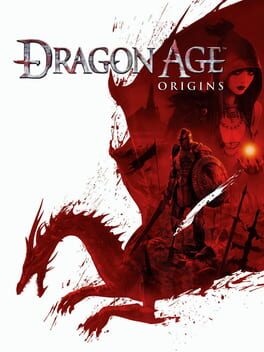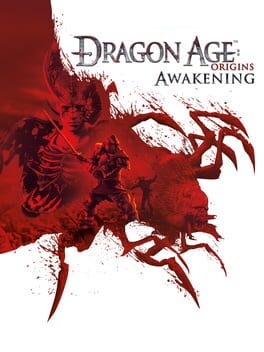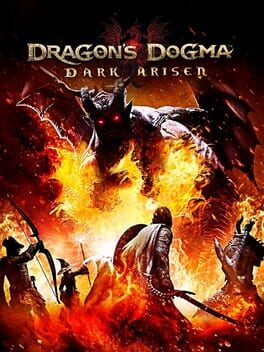getbehindmesatan
2019
Ending was a bit underwelming but I think I was expecting a lot more story-heavy game when it's really maybe 60-40 Mafia-simulator visual novel.
But the worldbuilding, characters, premise are super fascinating, and tbh I would love to see a normal visual novel in the same universe. The gameplay is also pretty well done - it can get a bit old when searching for the last few bits of information, and I am admittedly already a bit of a social deduction game fiend, but all in all it does a surprisingly good job of adapting it into video game form.
But the worldbuilding, characters, premise are super fascinating, and tbh I would love to see a normal visual novel in the same universe. The gameplay is also pretty well done - it can get a bit old when searching for the last few bits of information, and I am admittedly already a bit of a social deduction game fiend, but all in all it does a surprisingly good job of adapting it into video game form.
2016
This review contains spoilers
Whereas I felt the first game was a good mystery that nonetheless found its greatest strength in the cast, this feels like a game that basically sacrifices everything for The Twist.
Now, I'm torn over the Twist. I think it's incredibly gutsy and impressive technically, and no matter how mad I am I have to admit Uchikoshi has got me beat fair and square.
But it's also... not actually relevant to anything in the game? Yes, it is important to the secret ending with Shigure, but structuring your entire game for a payoff in an obscure meta-fictional side ending is a very clever trick but not amazing storytelling. I think perhaps if they'd pushed it further, it could've been more meaningful, but as it is it feels both like the Twist eats up too much of the story and also is completely irrelevant to it.
Aside from that, I didn't really care for the new characters. Ryuki and Tama were entertaining, and I have a soft spot for Kizuna and Shoma, but on the whole it felt like the game puts so much effort into characterising them but it's all quantity and no quality. They just... aren't fun. Mame and Gen I found especially one-note.
All in all, this game is an interesting experiment, and I have to respect it on that level... but experiments are not good storytelling.
With that said, this game feels like it does gradually improve on a few ideas from ZTD (not going to spoil that game but The Twist, as well as anachronic order), so maybe in another 5 years we'll finally get a game that fulfills this experimental promise and is actually good?
Now, I'm torn over the Twist. I think it's incredibly gutsy and impressive technically, and no matter how mad I am I have to admit Uchikoshi has got me beat fair and square.
But it's also... not actually relevant to anything in the game? Yes, it is important to the secret ending with Shigure, but structuring your entire game for a payoff in an obscure meta-fictional side ending is a very clever trick but not amazing storytelling. I think perhaps if they'd pushed it further, it could've been more meaningful, but as it is it feels both like the Twist eats up too much of the story and also is completely irrelevant to it.
Aside from that, I didn't really care for the new characters. Ryuki and Tama were entertaining, and I have a soft spot for Kizuna and Shoma, but on the whole it felt like the game puts so much effort into characterising them but it's all quantity and no quality. They just... aren't fun. Mame and Gen I found especially one-note.
All in all, this game is an interesting experiment, and I have to respect it on that level... but experiments are not good storytelling.
With that said, this game feels like it does gradually improve on a few ideas from ZTD (not going to spoil that game but The Twist, as well as anachronic order), so maybe in another 5 years we'll finally get a game that fulfills this experimental promise and is actually good?
This review contains spoilers
I enjoyed this way much more than Onikakushi (which took me 5 months, vs like 12 days for this lol). It felt like this chapter has a much stronger structure, both in the slice-of-life parts (does Shion actually exist? What is going on with Mion?) and then once the murders actually start happening.
In fairness, I think the atmosphere wasn't as strong as the latter half of Onikakushi, but I felt more invested here once stuff actually starts happening, because the slice-of-life felt a bit stronger and not just there to bide time til creepy stuff starts happening.
In fairness, I think the atmosphere wasn't as strong as the latter half of Onikakushi, but I felt more invested here once stuff actually starts happening, because the slice-of-life felt a bit stronger and not just there to bide time til creepy stuff starts happening.
This review contains spoilers
Pretty good! Ch2 was an improvement over 1 I thought in that the slice-of-life first half is still driven by an actual plot (what's the deal w Shion?), but this taking it even further with Satoko worked really well.
If there's one complaint I have, it's that I felt like the plot kind've peaks with the night of the Festival, and then... keeps going for a good while. And it has a lot of good, exciting/sad/intriguing moments still. But I think since I'm used to the time loop format now, I basically checked out after Keiichi kills Satoko's uncle thinking 'OK, and then Keiichi's gonna die horribly any moment now'. I'm not sure the tension and horror particularly works for me when I know it's happening for the third time. (It also doesn't help that the volcano gas thing feels like a ridiculous escalation - and yes, it's an interesting mystery, but it feels like such a wild ass pull I really need to put my faith in future installments for this to feel satisfying).
With that said, the glimpses of Satoko's sheer terror triggered by random innocuous actions was really effective, enough that it doesn't really matter her uncle is barely a character despite being crucial to the chapter. That one TIP with the sad picture of Satoko in the background over stats on child abuse w a scare chord playing sounds like a shitpost but it was genuinely so chilling too.
If there's one complaint I have, it's that I felt like the plot kind've peaks with the night of the Festival, and then... keeps going for a good while. And it has a lot of good, exciting/sad/intriguing moments still. But I think since I'm used to the time loop format now, I basically checked out after Keiichi kills Satoko's uncle thinking 'OK, and then Keiichi's gonna die horribly any moment now'. I'm not sure the tension and horror particularly works for me when I know it's happening for the third time. (It also doesn't help that the volcano gas thing feels like a ridiculous escalation - and yes, it's an interesting mystery, but it feels like such a wild ass pull I really need to put my faith in future installments for this to feel satisfying).
With that said, the glimpses of Satoko's sheer terror triggered by random innocuous actions was really effective, enough that it doesn't really matter her uncle is barely a character despite being crucial to the chapter. That one TIP with the sad picture of Satoko in the background over stats on child abuse w a scare chord playing sounds like a shitpost but it was genuinely so chilling too.
This review contains spoilers
First and foremost: fuck the mahjong section. It sucked. I've built up a pretty good tolerance for slice of life, and I'm sure if I ever played it mahjong would be a beautiful and intricate game, but that scene was awful. It did not help reading in Japanese I'm sure but I can't imagine it was any better in English.
That aside, a nice, short break from the usual time loop formula which was starting to drag a little. On the whole it doesn't feel like there's a ton to dissect or theorize about here (and I think it's telling the All-Cast Review Session is 90% goofy antics), but it does feel like Rika finally gets some limelight of her own, even if she's still hugely veiled in mystery. There's definitely totally mundane explanations for her knowing the murders in advance, but I like to think she can have some psychic powers, as a treat.
I'm also sure that a lot of what's alluded to here will be important later, it just doesn't have that same ripeness for theorising earlier chapters did I think.
Akasaka didn't feel super in-depth, but his relationships with Ooishi and Rika in particular felt charming enough.
It's interesting that the events that end up happening seem to be identical to Tatarigoroshi, except Ooishi survives - is this significant? Or is it genuinely just him being sick that branched the timeline? Definitely very keen to get into the Answer Arcs (but maybe I'll mull on some mysteries a bit more).
That aside, a nice, short break from the usual time loop formula which was starting to drag a little. On the whole it doesn't feel like there's a ton to dissect or theorize about here (and I think it's telling the All-Cast Review Session is 90% goofy antics), but it does feel like Rika finally gets some limelight of her own, even if she's still hugely veiled in mystery. There's definitely totally mundane explanations for her knowing the murders in advance, but I like to think she can have some psychic powers, as a treat.
I'm also sure that a lot of what's alluded to here will be important later, it just doesn't have that same ripeness for theorising earlier chapters did I think.
Akasaka didn't feel super in-depth, but his relationships with Ooishi and Rika in particular felt charming enough.
It's interesting that the events that end up happening seem to be identical to Tatarigoroshi, except Ooishi survives - is this significant? Or is it genuinely just him being sick that branched the timeline? Definitely very keen to get into the Answer Arcs (but maybe I'll mull on some mysteries a bit more).
This review contains spoilers
Pretty good, Shion's state of mind and the twins' sense of self-identity is really fascinating, the 'one year earlier' stuff clarifies a lot, and it's impressive how it puts such a different spin on what was happening behind the scenes in Watanagashi without seeming like an ass-pull (although I'll admit the one thing I'm a bit 'oh, well that's kindve contrived' is the significance of Keiichi not giving Mion the doll just being 'she rang up Shion to complain')
I will say that while it's really interesting to see Shion's side of things and recontextualise Watanagashi a lot, I did feel like the pacing dragged a bit knowing what would happen, especially after about the middle third?
Incidentally not really seeing Satoko and Rena since Tatarigoroshi made me really realise how much I've come to appreciate and care for these characters whenever they briefly turned up here.
I will say that while it's really interesting to see Shion's side of things and recontextualise Watanagashi a lot, I did feel like the pacing dragged a bit knowing what would happen, especially after about the middle third?
Incidentally not really seeing Satoko and Rena since Tatarigoroshi made me really realise how much I've come to appreciate and care for these characters whenever they briefly turned up here.
This review contains spoilers
All up a real roller-coaster. The pacing is the weirdest of them all so far imo, but not necessarily bad, but it makes up for it with tons of super raw moments (Rena's tearful confession to her friends, Rika confronting Rena, Keiichi remembering the events of Onikakushi, basically the whole ending sequence and especially the rooftop duel).
I will say though, while in hindsight the big picture of this chapter feels satisfying and makes sense, I found this probably the most annoying to actually read since Onikakushi - I guess because the odd pacing makes you wonder why certain elements are being thrown out and a decent chunk of it does kind've feel like an Onikakushi redux til it finally clicks that this is actually a tragedy-farce.
Also I found some moments didn't really hit right at first until elaboration - like, the flashback where Keiichi shoots a kid in the eye was genuinely disturbing, but the initial framing of 'Keiichi used to menace little kids with a model gun and feels horribly guilty over it' felt a little overdone. It wasn't that the events themselves were absurd, but the framing felt a little vague and undercooked. I guess telling not showing, essentially. And ofc it's fine in the end bc we do get that detail, but it did stand out to me.
I will say though, while in hindsight the big picture of this chapter feels satisfying and makes sense, I found this probably the most annoying to actually read since Onikakushi - I guess because the odd pacing makes you wonder why certain elements are being thrown out and a decent chunk of it does kind've feel like an Onikakushi redux til it finally clicks that this is actually a tragedy-farce.
Also I found some moments didn't really hit right at first until elaboration - like, the flashback where Keiichi shoots a kid in the eye was genuinely disturbing, but the initial framing of 'Keiichi used to menace little kids with a model gun and feels horribly guilty over it' felt a little overdone. It wasn't that the events themselves were absurd, but the framing felt a little vague and undercooked. I guess telling not showing, essentially. And ofc it's fine in the end bc we do get that detail, but it did stand out to me.
This review contains spoilers
Despite the fact the first 10 sub-chapters or so are basically going back and forth with Child Services I felt like the pacing on this was pretty good? The events themselves are repetitive, but not the characters' reactions or the drama it creates, and it added a lot to the suspense wondering 'how the hell does this end in a massacre?'
...With that said, I don't think it quite lives up to this suspense. Every Higurashi chapter so far imo has fallen prey to a trap of 'interesting and engrossing plot that builds up to a climax midway and then the tension completely dies' (except for Onikakushi and Watanagashi, which I'd say more straightforwardly continually ratchet up the tension). But it feels especially unsatisfying here because saving Satoko takes up a huge chunk of the chapter.
The actual scene where the main cast get killed is super chilling, but to immediately follow it up with them all reuniting as ghosts is a bit saccharine I feel? Tsumihoroboshi also had a bit of mood whiplash with Rena and Keiichi's fight that I didn't entirely vibe with, but I think it's fair to say it at least means something after all the heaviness of the previous arcs + Rena trying to blow up the school. But I don't know... this felt like it diminished it a little. I guess because also this arc isn't especially heavy on the oppressive horror atmosphere that pervades a lot of the others, so it feels like when we finally get a taste of that it immediately gets undercut.
Also I think the absolute worst thing for Higurashi's pacing is characters' internal monologues. People malign the Onikakushi slice of life stuff a lot (and rightfully), but Rika is just constantly going on about fighting destiny and believing in a miracle and whatnot and it's just... I get the point, but it could have been dialled back.
And on that note, this chapter pushes 'if everyone believes they can make a miracle happen' so hard it was genuinely starting to sound less like typical anime power of friendship and more like that culty pseudoscience self-help nonsense that teach bad things happening to you is because you didn't do enough positive thinking. I understand this isn't the intention here, and 'keep on believing and fighting' is a valuable message in the context of the story, and I'm not trying to be cynical here - it's just it gets hammered home so. Damn. Much.
This review sounds pretty critical, but I generally enjoyed this chapter (and Higurashi so far) a lot - I'm just more interested in trying to dissect what didn't work for me than what did. But all in all it's a nice chapter with lots of good character moments and answers to mysteries, and I am eager to get into the finale (though perhaps not right away).
Currently I'd rank the arcs at: Meakashi > Tatarigoroshi > Watanagashi > Tsumihoroboshi > Minagoroshi > Himatsubushi > Onikakushi
...With that said, I don't think it quite lives up to this suspense. Every Higurashi chapter so far imo has fallen prey to a trap of 'interesting and engrossing plot that builds up to a climax midway and then the tension completely dies' (except for Onikakushi and Watanagashi, which I'd say more straightforwardly continually ratchet up the tension). But it feels especially unsatisfying here because saving Satoko takes up a huge chunk of the chapter.
The actual scene where the main cast get killed is super chilling, but to immediately follow it up with them all reuniting as ghosts is a bit saccharine I feel? Tsumihoroboshi also had a bit of mood whiplash with Rena and Keiichi's fight that I didn't entirely vibe with, but I think it's fair to say it at least means something after all the heaviness of the previous arcs + Rena trying to blow up the school. But I don't know... this felt like it diminished it a little. I guess because also this arc isn't especially heavy on the oppressive horror atmosphere that pervades a lot of the others, so it feels like when we finally get a taste of that it immediately gets undercut.
Also I think the absolute worst thing for Higurashi's pacing is characters' internal monologues. People malign the Onikakushi slice of life stuff a lot (and rightfully), but Rika is just constantly going on about fighting destiny and believing in a miracle and whatnot and it's just... I get the point, but it could have been dialled back.
And on that note, this chapter pushes 'if everyone believes they can make a miracle happen' so hard it was genuinely starting to sound less like typical anime power of friendship and more like that culty pseudoscience self-help nonsense that teach bad things happening to you is because you didn't do enough positive thinking. I understand this isn't the intention here, and 'keep on believing and fighting' is a valuable message in the context of the story, and I'm not trying to be cynical here - it's just it gets hammered home so. Damn. Much.
This review sounds pretty critical, but I generally enjoyed this chapter (and Higurashi so far) a lot - I'm just more interested in trying to dissect what didn't work for me than what did. But all in all it's a nice chapter with lots of good character moments and answers to mysteries, and I am eager to get into the finale (though perhaps not right away).
Currently I'd rank the arcs at: Meakashi > Tatarigoroshi > Watanagashi > Tsumihoroboshi > Minagoroshi > Himatsubushi > Onikakushi
This review contains spoilers
i'm not entirely sure how i feel about matsuribayashi. it's ok. i think it's telling that it took me the second longest out of any higurashi chapter to actually finish (about a month and a half), after onikakushi (5 months), which I almost but not quite outright disliked.
It was a Slog. I have a big aversion to stories that are just way too long for their own good, but the thing is up until now I genuinely felt that Higurashi managed to keep things fresh and interesting enough this massive sprawling length never became a detriment. That's not to say Ryukishi isnt way too verbose and repetitive for his own good, but on the whole every instalment felt like a cool and interesting twist on the Higurashi formula with its own distinct atmosphere, without needing to pull crazy genre shifts or resort to gimmicks. Even the unnerving creeping sense of doom of Watanagashi is very different to the tragic descent into madness of Meakashi, for instance.
Matsuribayashi... to be honest, I did not feel accomplished this. For sure, it's a new type of story for Higurashi, more of an actiony conspiracy theory with a dash of politics. But while perhaps new for Higurashi it feels like a fairly generic story in general. Stuff like 'the games club manage to successfully wage guerilla warfare against hardened mercenaries' is easy to criticise on the basis of unrealism - I don't personally think unrealism or being shonen-esque an inherently bad thing, but it feels weird and off for the kind of story Higurashi has been up til now, and especially by comparison seems like a cheap resolution.
Now, I get that this is a deliberate bait and switch in a sense. Ryukishi offers you a psychological horror where you can trust nobody full of the threat of monsters at every turn, and then gradually takes it apart to promote trusting your friends, working together with your community, extending grace even to the monsters. I get the reasons why it's being done, I get there's a thematic point to Scooby Doo-ing it all. But the sticking point for me is that I feel like the story Higurashi turns into is a lot less interesting than the one it began as.
I'm certainly not against these kinds of bait and switches (ask me why Hell Bent from Doctor Who is one of my favourite pieces of fiction ever). But the crucial thing for me is that the story it ends up as should be just as, if not more interesting than what was promised, or at least more satisfying (even if the initial story has more of an allure of deep lore and shocking reveals). But I don't know, I... just don't feel like creepy rural horror mystery descending into action thriller is an interesting turn of events. And ironically even though Ryukishi justifies the switch by saying that Higurashi's worldview is a nonviolent one, it still turns into the kind of story where the primary means of solving problems IS through action (if not actually killing): breaking into the bad guys' base with guns.
Now, with all that said, it's not a bad ending. None of the narrative decisions it makes are bad. It's no Rise of Skywalker, making such actively ridiculous choices the promise of the previous entries is ruined. It has good moments, and Takano is such a fascinatingly sketched character. But I can't help but feel like it's largely an exercise in ticking plot boxes.
And maybe that's just an inevitable result of a finale to a mystery where the mystery has already been revealed, but part of me feels like the entire government conspiracy angle just pushes the stakes too high where the story has no choice but to shift into an action thriller to solve it. Teenagers in a horror story might be able to fight a monster, but how can they fight hardened mercenaries? There's no choice but to shift genres.
But at the end of the day the above is largely a personal gripe. Obviously I feel strongly about this and it diminished my enjoyment, but I get where Ryukishi is coming from enough I hesitate to say This Is A Flaw, and I don't want my criticms to basically just be 'you should have written a fundamentally different story'.
One thing I did think was actively bad tho and tbh has probably seriously hurt my opinion of Matusribayashi is Fragment Connecting. It felt like 90% painstakingly spoonfeeding you plot points you should already know or have been able to piece together. We often hear 'show don't tell' but I genuinely think Fragment Connecting was an example of this gone way too far; some things can be left to casual exposition. Ironically it felt like the anti-Onikakushi; it's even more useless filler but at least this time it's plot relevant! Admittedly I'd imagine this would have been a helpful refresher if you were actually reading the Higurashi instalments as they came out.
The rest of Matsuribayashi is better, although it still feels like it doesn't really pick up til Irie escapes the clinic, and even then the action scenes are kind've annoying (I did like infiltrating the clinic though). But it's fine and servicable.
Aside from that, Hanyuu still feels like a bit of a weak link characterisation wise, especially since Matsuribayashi brings a lot in to weigh on her. She's not bad or unlikeable, but I just... don't feel the same attachment to her I do the others. I think Higurashi's strength on the whole is generally the characters, and I think Matsuribayashi did a great job with fleshing ouit Takano last minute tremendously, but Hanyuu is just... I don't know.
On the whole I would say I enjoyed Higurashi, and I wouldn't say my tepid feelings for Matsuribayashi are enough to drag the rest of it down, but I also don't think I especially love it (tho I still need to read Saikoroshi). Keeping me engrossed enough to sit through one million words and eight arcs is an impressive feat in itself, and I'll always have a soft spot for the characters, but I don't know that this will be something that stays with me. But my feelings about Matsuribayashi are in flux even now so I guess we will see.
It was a Slog. I have a big aversion to stories that are just way too long for their own good, but the thing is up until now I genuinely felt that Higurashi managed to keep things fresh and interesting enough this massive sprawling length never became a detriment. That's not to say Ryukishi isnt way too verbose and repetitive for his own good, but on the whole every instalment felt like a cool and interesting twist on the Higurashi formula with its own distinct atmosphere, without needing to pull crazy genre shifts or resort to gimmicks. Even the unnerving creeping sense of doom of Watanagashi is very different to the tragic descent into madness of Meakashi, for instance.
Matsuribayashi... to be honest, I did not feel accomplished this. For sure, it's a new type of story for Higurashi, more of an actiony conspiracy theory with a dash of politics. But while perhaps new for Higurashi it feels like a fairly generic story in general. Stuff like 'the games club manage to successfully wage guerilla warfare against hardened mercenaries' is easy to criticise on the basis of unrealism - I don't personally think unrealism or being shonen-esque an inherently bad thing, but it feels weird and off for the kind of story Higurashi has been up til now, and especially by comparison seems like a cheap resolution.
Now, I get that this is a deliberate bait and switch in a sense. Ryukishi offers you a psychological horror where you can trust nobody full of the threat of monsters at every turn, and then gradually takes it apart to promote trusting your friends, working together with your community, extending grace even to the monsters. I get the reasons why it's being done, I get there's a thematic point to Scooby Doo-ing it all. But the sticking point for me is that I feel like the story Higurashi turns into is a lot less interesting than the one it began as.
I'm certainly not against these kinds of bait and switches (ask me why Hell Bent from Doctor Who is one of my favourite pieces of fiction ever). But the crucial thing for me is that the story it ends up as should be just as, if not more interesting than what was promised, or at least more satisfying (even if the initial story has more of an allure of deep lore and shocking reveals). But I don't know, I... just don't feel like creepy rural horror mystery descending into action thriller is an interesting turn of events. And ironically even though Ryukishi justifies the switch by saying that Higurashi's worldview is a nonviolent one, it still turns into the kind of story where the primary means of solving problems IS through action (if not actually killing): breaking into the bad guys' base with guns.
Now, with all that said, it's not a bad ending. None of the narrative decisions it makes are bad. It's no Rise of Skywalker, making such actively ridiculous choices the promise of the previous entries is ruined. It has good moments, and Takano is such a fascinatingly sketched character. But I can't help but feel like it's largely an exercise in ticking plot boxes.
And maybe that's just an inevitable result of a finale to a mystery where the mystery has already been revealed, but part of me feels like the entire government conspiracy angle just pushes the stakes too high where the story has no choice but to shift into an action thriller to solve it. Teenagers in a horror story might be able to fight a monster, but how can they fight hardened mercenaries? There's no choice but to shift genres.
But at the end of the day the above is largely a personal gripe. Obviously I feel strongly about this and it diminished my enjoyment, but I get where Ryukishi is coming from enough I hesitate to say This Is A Flaw, and I don't want my criticms to basically just be 'you should have written a fundamentally different story'.
One thing I did think was actively bad tho and tbh has probably seriously hurt my opinion of Matusribayashi is Fragment Connecting. It felt like 90% painstakingly spoonfeeding you plot points you should already know or have been able to piece together. We often hear 'show don't tell' but I genuinely think Fragment Connecting was an example of this gone way too far; some things can be left to casual exposition. Ironically it felt like the anti-Onikakushi; it's even more useless filler but at least this time it's plot relevant! Admittedly I'd imagine this would have been a helpful refresher if you were actually reading the Higurashi instalments as they came out.
The rest of Matsuribayashi is better, although it still feels like it doesn't really pick up til Irie escapes the clinic, and even then the action scenes are kind've annoying (I did like infiltrating the clinic though). But it's fine and servicable.
Aside from that, Hanyuu still feels like a bit of a weak link characterisation wise, especially since Matsuribayashi brings a lot in to weigh on her. She's not bad or unlikeable, but I just... don't feel the same attachment to her I do the others. I think Higurashi's strength on the whole is generally the characters, and I think Matsuribayashi did a great job with fleshing ouit Takano last minute tremendously, but Hanyuu is just... I don't know.
On the whole I would say I enjoyed Higurashi, and I wouldn't say my tepid feelings for Matsuribayashi are enough to drag the rest of it down, but I also don't think I especially love it (tho I still need to read Saikoroshi). Keeping me engrossed enough to sit through one million words and eight arcs is an impressive feat in itself, and I'll always have a soft spot for the characters, but I don't know that this will be something that stays with me. But my feelings about Matsuribayashi are in flux even now so I guess we will see.
2009
Good game with a world that seems kinda generic fantasy with a slight edge to it at first but has just enough of a twist to it to be really interesting. The approach to religion is especially interesting, I think, in that it religion isnt treated as just Lore but as a worldview; the Chantry's belief in a good God who turned his back on humanity because of their wickedness has a lot of implications for the way someone views the world (challenged in turn by Leliana's own quiet heresy in feeling the Maker's presence still) in a way that fantasy faiths don't always.
The game's biggest flaw imo is the combat. Part of this may just be personal taste - I think really the appeal is more tactical like an RTS than RPGish - but I also just think the game is a bit overbloated with abilities. Throwing a million possible skills at the player doesn't equal build diversity, even with specialisations to try and bandage the problems. Dungeons are also just a bit too long that mediocre combat becomes actively painful at times; had they reduced the amount of fighting in certain parts it wouldn't be anywhere near as frustrating.
But all in all a fun and engrossing game with fascinating lore, good story with interesting choices, and a likeable enough cast.
The game's biggest flaw imo is the combat. Part of this may just be personal taste - I think really the appeal is more tactical like an RTS than RPGish - but I also just think the game is a bit overbloated with abilities. Throwing a million possible skills at the player doesn't equal build diversity, even with specialisations to try and bandage the problems. Dungeons are also just a bit too long that mediocre combat becomes actively painful at times; had they reduced the amount of fighting in certain parts it wouldn't be anywhere near as frustrating.
But all in all a fun and engrossing game with fascinating lore, good story with interesting choices, and a likeable enough cast.
A fun expansion to the original game with interesting concepts and just very fun questing all around. Even though it ends up not being particularly fleshed out the interplay of managing the arldom, making decisions, and pursuing various leads makes for an oddly compelling gameplay loop.
Combat remains a bit of a drag as in base Origins but I think the amount of combat is paced a bit better so it doesn't frustrate me as much. The campaign could have been a bit longer to play with its ideas more but I suppose it's better to end on a high than drag itself out.
The biggest flaw in Awakening is probably just the companions. It's disappointing they removed the ability to talk with them on demand - it really diminishes their character, especially in such a short campaign - but they're also, imo, just... not very interesting?
Anders is funny and Justice is an interesting concept, but aside from that they're all just a bit meh. To their credit none of them are outright annoying aside from Oghren, but I just really don't feel any attachment to them in the slightest.
Combat remains a bit of a drag as in base Origins but I think the amount of combat is paced a bit better so it doesn't frustrate me as much. The campaign could have been a bit longer to play with its ideas more but I suppose it's better to end on a high than drag itself out.
The biggest flaw in Awakening is probably just the companions. It's disappointing they removed the ability to talk with them on demand - it really diminishes their character, especially in such a short campaign - but they're also, imo, just... not very interesting?
Anders is funny and Justice is an interesting concept, but aside from that they're all just a bit meh. To their credit none of them are outright annoying aside from Oghren, but I just really don't feel any attachment to them in the slightest.
This review contains spoilers
Great game with fun combat and enjoyable quests, but I feel a bit insane seeing people talk about how the real game starts in the postgame, which consists entirely of a boss rush, a few overworld dragons, and the dlc dungeon you can do at any time prior.
It is a little disappointing the game totally segues from an interesting quest-based experience to pure dungeon crawling/boss fighting post-game. It's not as if the story itself is particularly interesting either (tho they try to do some cool stuff with the Seneschal), but there's just something about the quest design that's very satisfying.
It is a little disappointing the game totally segues from an interesting quest-based experience to pure dungeon crawling/boss fighting post-game. It's not as if the story itself is particularly interesting either (tho they try to do some cool stuff with the Seneschal), but there's just something about the quest design that's very satisfying.
